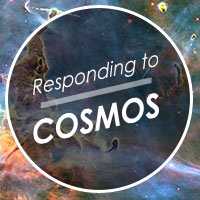 Culture & Ethics
Culture & Ethics
Darwin-Defending Historians Debate Whether It’s Justified for Cosmos “to Lie” for the Sake of Science
 There shouldn’t even be a debate over whether, in defending truth, it’s ever justified to lie. Yet over at H-Net, an international consortium of scholars and teachers interested in the humanities and social sciences, Darwin-defending historians of science are mulling whether it’s acceptable for the new Cosmos series “to lie” for a good cause — in this case, defending the authority of science.
There shouldn’t even be a debate over whether, in defending truth, it’s ever justified to lie. Yet over at H-Net, an international consortium of scholars and teachers interested in the humanities and social sciences, Darwin-defending historians of science are mulling whether it’s acceptable for the new Cosmos series “to lie” for a good cause — in this case, defending the authority of science.
In a post titled “We need to talk about Cosmos…,” historian of science Joseph Martin (pictured at left), who teaches at Colby College, refers to the falsehoods promoted by Cosmos about the history of science. Cosmos, as our readers will know, has persistently offered a false version of history where religion never positively influences the development of science. Martin writes:
I’ve been watching with interest as the history of science community, particularly on Twitter, has reacted with consternation to the historical components of Neil deGrasse Tyson’s Cosmos reboot. To a large extent I agree with these criticisms. It is troubling that the forums in which the public gets the most exposure to history of science also tend to be those in which it is the least responsibly represented.
But part of me also wants to play devil’s advocate. First, Cosmos is a fantastic artifact of scientific myth making and as such provides a superb teaching tool when paired with more responsible historical presentations and perhaps some anthropological treatments of similar issues like Sharon Traweek’s Beamtimes and Lifetimes.
Second, I don’t know that we, as a community, have adequately made the case that the scholarly view of history we advance is, in fact, more useful for current cultural and political discourse than the naïve view scientists advance. One thing we often see in our research, and parallel work in philosophy of science, is that “right” is often not the same thing as “useful.” I’m interested in generating some discussion in why and how, if at all, we can make the case that “useful” and “right” are and should be the same thing in this case for reasons other than internal professional ones.
Let me translate. First, he acknowledges that Cosmos has been legitimately criticized for its inaccurate portrayal of the history of science. But he wants to defend Cosmos, playing the “devil’s advocate.” Why? Because the “naïve view scientists advance” — that science is always good, and religion is always getting in the way — might be more “useful” when talking to the public, even if it isn’t “right.” But what does he mean by “useful”? And is he really suggesting it might be OK to lie in the service of defending the prestige of science? Yes he is, and that becomes clear in his next comment:
If we [grant] Cosmos the artistic license to lie, the question is then whether it doing so in service of a greater truth and if so, what is it? And what does it mean for us if it turns out that Cosmos and the history community are simply going after different truths?
For the record, I myself am still very much on the fence about this issue, but if I were tasked with mounting a defense of Cosmos as it stands, one of the things I’d say is that the stakes of scientific authority are very high right now, especially in the United States. Perhaps the greater truth here is that we do need to promote greater public trust in science if we are going to tackle some of the frankly quite terrifying challenges ahead and maybe a touch of taradiddle in that direction isn’t the worst thing.
 A “taradiddle,” of course, is a lie (“a statement known by its maker to be untrue and made in order to deceive”). So basically he’s saying it’s possibly OK for Cosmos “to lie” about the history of science if that helps “promote greater public trust in science.”
A “taradiddle,” of course, is a lie (“a statement known by its maker to be untrue and made in order to deceive”). So basically he’s saying it’s possibly OK for Cosmos “to lie” about the history of science if that helps “promote greater public trust in science.”
It’s a sickening idea that lies may be necessary to get people to trust an institution like science. That aside, how can we know “it” (i.e., the community that Tyson is purporting to speak for, and using falsehoods to do so, in Cosmos) deserves our trust if it might be necessary “to lie” to defend it?
All this reminds me of how biology professor and science blogger Bora Zivkovic said it’s OK to tell teach false claims to students for the purpose of “gaining trust” so they’ll “accept evolution.” It also reminds me of an infamous comment from Darwin-defending philosopher of science Philip Quinn in Michael Ruse’s book But Is It Science?, which discussed whether creationism is science. The full quote is worth reading carefully, as Quinn makes much the same argument that Martin does:
It sometimes happens that the best arguments one can give in support of a view are not going to be effective and the most effective arguments one can give are not going to be good. After all, decision-makers are sometimes too busy to master complex arguments. Then, too, they can be prejudiced or even stupid. When one is aware that this is the situation — and I suspect this is rather common — then one confronts the philosopher’s dilemma.
One horn looks roughly like this. Convinced of the overall rightness of one’s position, one opts to present the effective bad argument. Each time one does this, one’s hands get a little bit dirtier. At first one is painfully sensitive to even small compromises that one knows to be violations of one’s intellectual integrity, but gradually numbness of conscience sets in. At last, when presenting the effective bad argument has become easy and habitual — second nature, as it were — one’s hands have become dirty beyond all cleansing and one suffers from a thoroughgoing corruption of mind.
The other horn looks roughly like this. Concerned to preserve one’s integrity at all costs, one resolves never to present the effective bad argument. One always presents the best argument one can for the position one thinks most nearly right, and one’s hands remain clean. But frequently these good arguments fail to persuade or carry the day, and gradually one’s credibility and effectiveness wane. At last, when one has an established track record of failure, the decision-makers conclude that one is of no use to them, and one is unceremoniously cast aside.
Though it should be obvious that I have been exaggerating a bit for rhetorical effect, I think the hard choice between corruption and ineffectuality is sometimes real enough. That is the dilemma! Is there a way between its horns? Perhaps. My colleague, Dan Brock, suggests that academic philosophers should only get involved in the policy-making arena on a temporary, short-term basis. Maybe this is a way in which we could manage to have our cake and eat it too. For a short period one might engage in giving bad effective arguments without being thoroughly corrupted. Then one could retreat back to the academy to wash one’s moderately soiled hands.
After having one’s intellectual integrity restored and reinforced, one might then be ready to repeat the cycle.
The application of what I have been saying to the creationist controversy is straightforward. It seems to me that the attempts by creationists to foist their particular brand of dreadful science on public school curricula are pernicious. We should resist such attempts and resist them effectively in the political realm. But some of the creationists who are making such attempts are, to put it not too harshly, shysters. So there may well be circumstances in which only the bad effective argument will work against them in the political or legal arenas. If there are, then I think, though I come to this conclusion reluctantly, it is morally permissible for us to use the bad effective argument, provided we continue to have qualms of conscience about getting our hands soiled. But I also believe we must be very careful not to allow ourselves to slide all the way down the slippery slope to intellectual corruption. Perhaps, if we divide up the labor so that no one among us has to resort to the bad effective argument too frequently, we can succeed in resisting effectively without paying too high a price in terms of moral corruption.
(Philip L. Quinn, “Creationism, Methodology, and Politics,” in Ruse M., ed., But Is It Science?: The Philosophical Question in the Creation/Evolution Controversy, Prometheus Books: Amherst NY, 1996, pp. 397-399.)
Did you read all that?
According to Quinn, because “creationists” are “shysters” and promote “dreadful” and “pernicious” initiatives, that means it is “morally permissible” to respond using “bad arguments” (i.e., fallacious arguments) which amount to “compromises that one knows to be violations of one’s intellectual integrity” and lead to “intellectual corruption,” simply because those bad arguments are “effective” in defending evolution. (In case you’re wondering, the “effective” but “bad arguments” that Quinn is talking about are the dubious demarcation criteria which Michael Ruse endorsed during his testimony in the 1981 McLean v. Arkansas. Judge Overton then adopted and employed Ruse’s demarcation criteria when ruling creationism is not science.)
Quinn thinks one can “retreat back to the academy to wash one’s moderately soiled hands.” However, if the academy is recommending we should tell “taradiddles” or promote fallacious arguments simply because they’re “effective,” then that hardly seems like the place to go in search of moral or ethical cleansing.
